James Pulham- Chef & Ironman
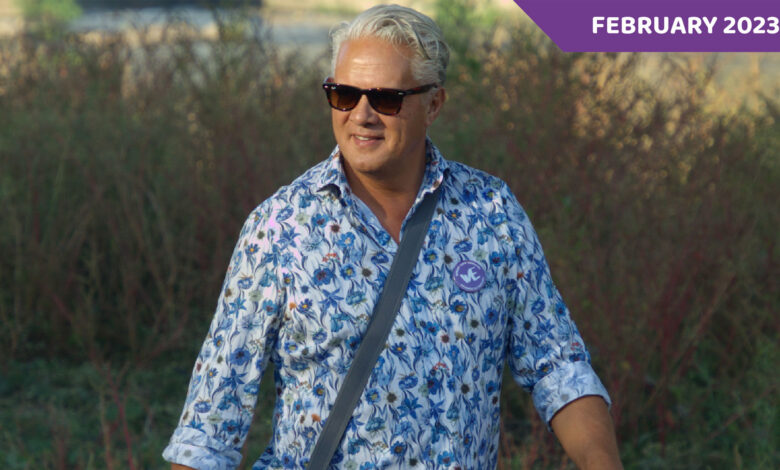
Q. To start off with, you have recently been a part of the My River, My Valentine initiative where citizens of Pune gathered for a cleanup drive of the Mula-Mutha. How was the experience for you?
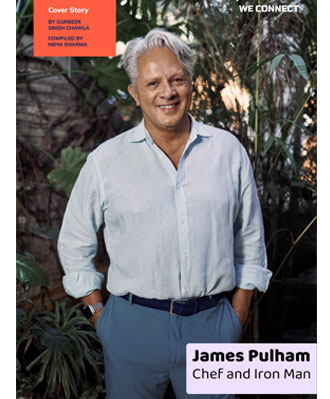
I was pleased to help clean the rivers, especially Mula-Mutha. Mula-Mutha is the lifeblood, it is Mother Nature’s lifeblood for all of us. Protecting our rivers is critical because rivers support people, economies, and biodiversity. Polluted rivers are not just a threat to the environment but also a health risk for the people. The initiative saw overwhelming participation, especially from the youth. The experience of being a part of something so significant is surreal in itself. I’m glad that people are ready to be the change that they want to see!
Q. What inspired your interest in the preservation of rivers here in India?
My Maori culture has taught us to look after nature. We respect the mountains, we respect the rivers, and we make sure that we look after them for the next generation. I have known Parag (Founder, WE Foundation) for a long time, we swam together in the rivers of New Zealand. You can actually drink the river water in New Zealand, so that’s what I would love to see happening here, in India as well.
Q. You are an internationally celebrated Chef from New Zealand. Why did you want to be a chef? Who is your inspiration?
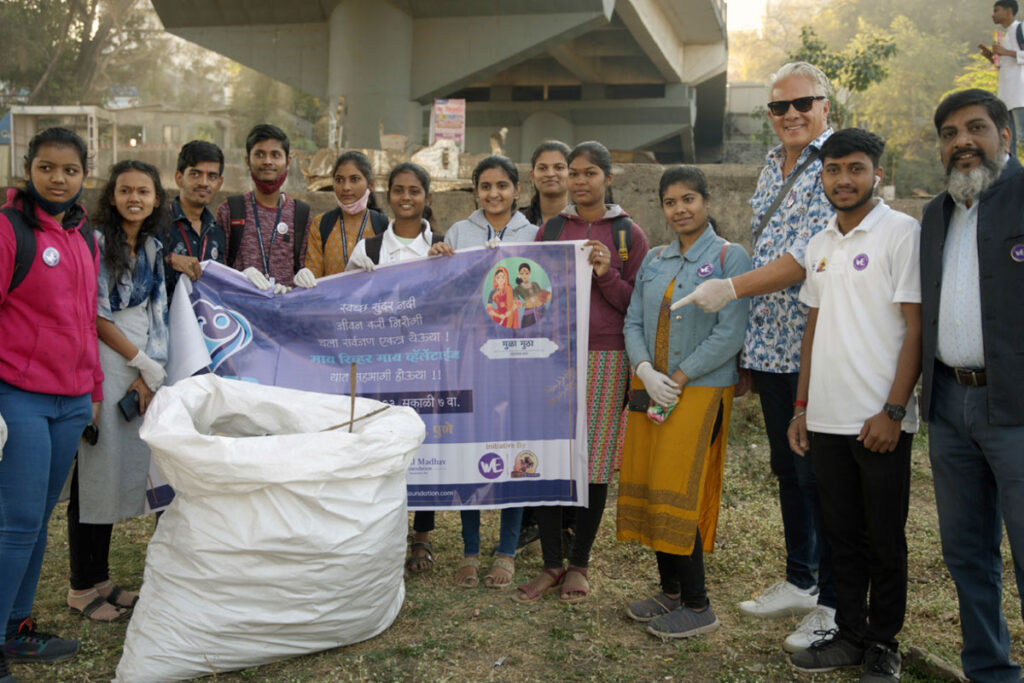
A. “What are we going to eat Bubby, we are starving?” This was the question that was always asked by my four brothers and sisters. We were constantly hungry and I took on the task of ensuring we had something to eat. As you might imagine, my early childhood came from humble beginnings. My parents were young at the time, and societal pressures put a lot of strain on us all. Growing up in New Zealand was mythologised as a land of milk and honey, with an abundance of natural resources, I still to this day find it unfathomable that we were in this situation. We managed to get through this difficult phase by being entrepreneurial, adaptable, and brave to do what it took to put a little food on the table. It was at this stage that I started to dream about a life with food. Subconsciously, the idea of being a chef was born.
Q. Who is your inspiration?
I have three!
Firstly, there was my Aunty Violet who raised me on a farm as her own for my first five years. Being a hotel cook herself, she taught me the value of creating something special with limited ingredients. We had no power, no running water and she would prepare the most amazing meals over a fire or wood stove. She would say ‘Bubby (I was the youngest of three boys at Aunty Violet’s hence my nickname to this day) anything cooked with love is good for your tummy. I learnt from her the value of hard work, using the land, forests, rivers and oceans as a supermarket and most of all the happiness of sharing a meal.
I stumbled upon Jacque Pepin, a legendary French chef when I found his book ‘Culinary Arts and Techniques’. He had such a good command of French cuisine that it opened my eyes from the impossible to the possible. And lastly Ted, the owner and operator of the first restaurant I was employed in as a dishwasher (my first job). I learnt the importance of washing dishes and how it is such an integral cog in running a successful restaurant. To this day, regardless of the position of staff in a kitchen, if they were not prepared to wash dishes when busy then I wouldn’t hire them. Ted also had the propensity to enjoy red wine so by service time he was unable to manage his station, so I would take over his job and he would yell instructions – a baptism of fire but I loved it!
Q. You have travelled to many countries as a chef. Which is your favourite country and why?
Yes, I have been to many countries and had the opportunity to taste and work with wonderful cooking styles and cuisines around the world. But the country to me that stands head and shoulders above the rest with its abundance of styles and flavours is INDIA. I am not saying this because of this article. It is because I have been visiting India for over twenty years. During this time I have demonstrated, taught, and cooked throughout India. Also, on top of my list of why INDIA is that of your genuine unassuming hospitality, ‘Atithi Devo Bhava: Guest is God’ – This is why I love India.
Q. How difficult is it to cook for people originating from different countries with peculiar tastes?
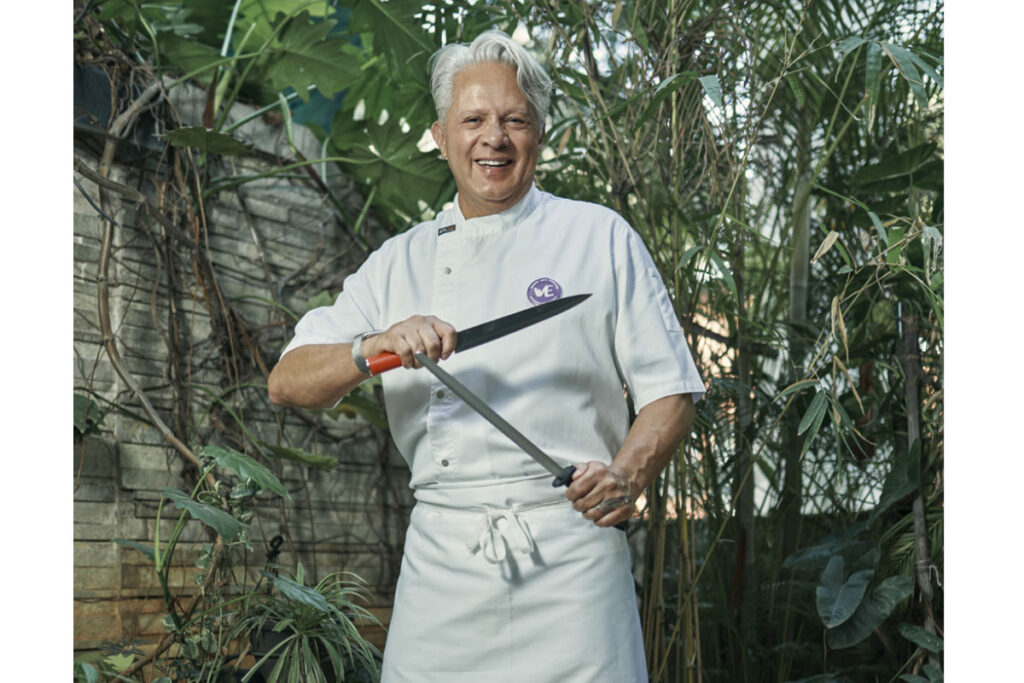
A. Food to me is an international language of oneness. If you show respect for the country’s culture, laws, history, and beliefs, you will be fine. I will always incorporate my knowledge of food and bring this to the table. People love to try different tastes to broaden their knowledge and nudge their taste buds so I will add different flavours of a western persuasion to create a fusion of joy. An example of this could be English Yorkshire puddings with butter chicken and yoghurt, baby green rice prawns (Vietnam) with mango chutney or American waffles topped with fresh berries, grilled bananas and custard apple cream. People cannot argue with their mouths full – they are more likely to smile with happiness
Q. What are the qualities one must possess for becoming a successful and celebrated chef?
A. Integrity and a genuine love for food – having an open mind – stamina and resilience – being calm under pressure – being well prepared – focusing at the moment – listening and reacting constructively with empathy – being a role model to your profession – managing and mentoring people – being aware that you do not know everything and above all try to remain humble. My wife said that I remind her of an ‘Eagle Duck’ when I am working – you are soaring calmly knowing that your kitchen is thrice checked and prepared, but I am paddling flat out like a duck ready to troubleshoot any issues whilst juggling every process. Be true to yourself and listen to your soul – have fun!
Q. Please tell us about the dishes you have created and which have become popular internationally.
A. As a lecturer in Culinary Arts, it was important that my students understood the basics of French cuisine. These skills will keep improving throughout the lifetime of a chef and over time, a chef’s unique style will emerge. I have had alumni open dining establishments around the world and have created a fusion of flavours from pie shops in China, kiwi breakfasts in Punjab and cheesecakes in South Korea to name a few. My students inspired me to create a fusion example of a baked whole salmon (NZ) basted with a teriyaki sauce (Japan) topped with a gremolata (Italian). Salmon is high in Omega-3 with potential health benefits for the heart, skin, arthritis and mind. So not only is this dish an amalgamation of wonderfully balanced flavours but also it is good for you
Q. What are your key focus areas as an international food consultant and what is the best thing you like about your training?
A. Whenever I create a menu, it is all about researching the following:
• Client requirements
• Dietary restraints
• What produce is in season
• Product quality and availability
• Style of the establishment
Once this is done, the fun starts – I start researching what will be suitable for dietary areas and these can range from vegetarian, gluten-free, vegan, dairy free and religious. Then I find out what produce is in the season because this is the time it tastes the best – for example:
• Summer – Gourds, okra, brinjal, melons, mango and berries
• Monsoon – stone fruits, custard apple and colocasia leaves
• Winter – Onions, garlic, carrots, beans, yams and mustard spinach
I also look for organic food that is void of chemicals as well as the wellbeing of farm animals that produce protein. From my own database and gained knowledge, the beginning of a menu is forged.
Q. What facilities are available for the education and health of the children deprived of education? What kind of future do you see You call India your second home. What attracts you towards India? What fascinated you to visit so many times?for capable children who are underprivileged?
My culture is that of a New Zealand Maori and my ancestors were great navigators with a lineage back to South East Asia. They sailed across to what is now called Hawaii then travelled down the length of the Pacific through Tahiti and most of the Pacific Islands to eventually arrive in Aotearoa (Land of the long white cloud). They were great navigators. So, you see, I am a natural traveller and I thank my ancestors for that. I have many friends in New Zealand who are of Indian heritage and my children used to call our friend’s mother from Gujarat ‘Ba’ – they learnt to eat with their hands and thus handle spicy food from an early age.
I met a good friend from India in New Zealand 20+ years ago and that inspired me to start travelling to India. Every time I travelled, I learnt, tasted and experienced something new which I am still doing to this very day. Apart from the kaleidoscope of contrasting colours, magnificent scenery and centuries of history, there is one area that has a similarity with my culture.
We say, ‘He tangata, he tangata, he tangata’ which means ‘it is people, it is people, it is people’ and that is what really brings me back. When I get off the plane in Mumbai, I take a breath and say ‘it’s good to be home’
Q. Maori are the indigenous Polynesian people of mainland New Zealand (Aotearoa). What are your thoughts on Maori culture and its sustainability?
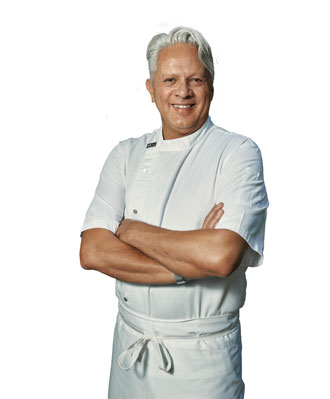
Maori culture and its sustainability are based on five values that are also embedded in our Treaty of Waitangi (New Zealand’s constitutional document) and these include: Whakaiti – Maori enables others – there is no self-promotion Manaakitanga – Altruism – This is based on knowledge, wisdom, and life experience. In broad terms, it can be classified as Aroha (love). This can include respect, hospitality, concern, and the act of giving.
Whanaungatanga– creating and enhancing relationships thus solidifying connections between the family and the community.
Kiatiakitanga – An example of this is looking after the environment with guardianship and protection.
Tikanga Maori – this is a common-sense approach using behavioural guidelines for living and interacting with others. Maori have a structural platform of values using past generational ideology to sustain the future of the world we live in. The concept of sustainability pertaining to Maori is documented in the ‘Treaty of Waitangi’, New Zealand’s founding document – February 06, 1840.
Q. How do you connect Maori and Indian culture?
A. For a start, I believe in the oneness of all. When you challenge yourself to investigate cultural similarities then often one is enlightened by the parallel of likeness. For example, in New Zealand in the 1930s, the education system taught school children that the original home of Maori was India (Jaya Chahan (c) 1999 – 2001, Once We Were Brothers). This thesis theorises the journey Maori made from South East Asia through to the Pacific and then down to New Zealand. I consistently call India my second home and this is maybe due to a subconscious link to my ancestors that have steered me 12,196 kilometres many times to this wonderful land – INDIA
Q. There are so many kinds of different Indian regional food. Which Indian food do you like the most?
No, you cannot do this to me! I have had the pleasure of eating chicken biryani in Hyderabad, Idli Sambhar in Chennai, benne masala dosa in Bangalore, kingfish at Calamari Beach Restaurant in Goa, pomfret and Bombay duck in Pune, Rajasthan red meat curry in Jaisalmer (Thar Desert) sitaphal cream in Mumbai, pani-puri and patra in Ahmedabad, momos and egg paratha in Kasol, dal makhani and lassi in Chandigarh, chole bhature in Delhi, pav bhaji and when I get off the plane in Mumbai, I can’t wait to have vada pav and chai. I am touched, moved and inspired by the flavours I have had the privilege to taste. I will take a humble pass on this question but I do feel obliged to share this story. I was travelling by car in the hills just out of Goa when we stopped at a village. I was invited into a farmer’s home with his family, cooling, very small, earthen floor, a cow and a calf also inside with us and we were offered tea. Sitting there having tea, bread and jaggery whilst patting a cow was one of the most emotionally blessed moments in my life. To this day I have had no better tea, bread or jaggery.
Q. You have met many great chefs from India. What capabilities do you admire in them? What is your message to aspiring and budding chefs in India?
Great questions. I love them! I have had the pleasure of meeting and teaching many chefs from India. With my hand on my heart, I can say they are great hard-working ambassadors for India and you should be very proud of them. In many countries, it is the Indian chefs that keep the hospitality industry turning over. From restaurants to hospitals and elderly rest homes to line production to cruise ships to hotels (front and back of house staff) to resorts to children’s daycares to schools and the tourism sector.
After covid lockdowns in New Zealand, it was the international Indian chefs and hospitality staff that inspiringly helped to resurrect the hospitality industry and for that, I am truly grateful. In my point of view, it is these chefs and their tutors from India that I would gladly classify as GREAT CHEFS!
My advice to aspiring and budding chefs is that if you are in the position to do so, travel overseas. Either as a learning pathway or to work. The experience would be invaluable and will be an excellent advantage for your career. The skills you obtain by doing this will add value to your own brand. You will learn to be independent; you will experience another country and most of all you will be able to wear India’s pride on your chef jacket. Yes, Chef!
Q. What advice would you give to the younger generation? Are you hopeful about the future of this planet?
Young people aren’t just the ‘victims’ of rapid environmental change, but they are also ‘the answer.’ They have shown time and again, through marches and positive action around the world, that they will be the heroes of the climate crisis. The only advice I would give to young people would be to replace anger with action. I’m glad to see the energy and participation of young people who are driving change, which also acts as a motivation to me. Also, every win we achieve together is a reminder that we can make a difference.

